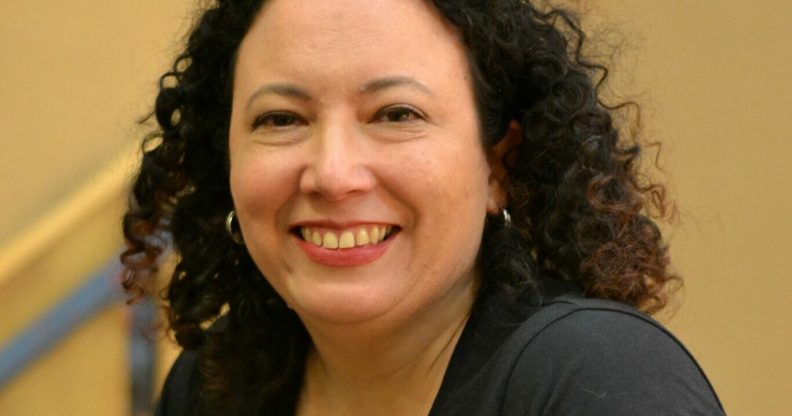Maya Forstater’s ‘gender critical’ views are ‘hate speech’ and a ‘threat to trans people’, tribunal told

Maya Forstater’s ‘gender critical’ views are protected by equalities law, a tribunal has ruled. (Nicole Jones /@satiricole)
“Gender critical” views are “hate speech” and an “existential threat to trans people rooted in insult and slander”, a UK tribunal was told today.
It was the second day of a landmark case that will determine whether it becomes legal to deadname and misgender trans people in the workplace.
The appeal has been brought by tax researcher Maya Forstater, who wants her “gender critical” view, which is that trans women are men and that she reserves the right to “say so whenever she wishes”, to be protected by the UK’s Equality Act.
Forstater’s lawyer argued yesterday that being asked to refer to trans people with the correct pronouns is “compelled speech” and that calling a trans women “she” or “her” forces a “gender critical” person to “express a view they do not share”.
Today, the barrister for Forstater’s former employer told London’s Employment Appeals Tribunal that a “core component” of Forstater’s “gender critical” view is misgendering trans people, which “causes enormous pain”, is “beyond offensive”, constitutes “harassment” and “will make workplaces dangerous to trans people”.
“This case is about the rights of workers, including trans workers, who will never be safe in the workplace again if this appeal is allowed,” argued Jane Russell for Washington-based think-tank the Center for Global Development (CGD).
“Maya is not being required to express a belief she does not hold. She is simply being required not to harass others.”
Maya Forstater believes ‘men cannot be women’
Maya Forstater took the CGD to an employment tribunal in 2019 arguing that they had discriminated against her for holding “gender critical” views. Her employment contract with the think-tank was not renewed after she upset colleagues with her anti-trans views in 2018.
This included Forstater vocally opposing trans rights reforms online, stating that “men cannot be women”, and responding in workplace Slack messages to colleagues challenging her negative comments about the physical appearance of a gender-fluid non-binary person, the tribunal was told.
The court heard today that two employees at CGD said her “gender critical” views were offensive, problematic, and made them uncomfortable and worried about how potential funders would react.
The 2019 employment tribunal ruled that Maya Forstater’s “gender critical” views do not qualify as a protected belief because they degrade the rights of trans people. The judge at that time said that her anti-trans views are “not worthy of respect in a democratic society“.
Gender Recognition Act means ‘it is possible to change sex’
Maya Forstater holds the “gender critical” opinion that there are only two sexes, male and female, and that it is not possible to change sex – including in cases where a trans person has gained legal recognition of their gender.
Dismissing this view today, Russell said “this debate is over… There is a democratic consensus that it is legally possible to change sex”.
She told the court that the Gender Recognition Act, which was enacted in 2004, is a “legal provision [that] allows a change in sex”.
“Where a full Gender Recognition Certificate is issued to a person, the person’s gender becomes for all purposes the acquired gender – so that if the acquired gender is the male gender, the person’s sex becomes that of a man,” Russell said.
She went on to quote French feminist Simone de Beauvoir: “As Simone de Beavoir observed, one is not born a woman, one becomes one. Why can that not apply to trans women, too?”
‘Gender critical’ beliefs ‘an existential challenge to trans people’
“[Maya Forstater’s] belief therefore is an existential challenge to trans people,” Russell said. “She says they are lying. She says to them: ‘You are not who you say you are, and even if you have a Gender Recognition Certificate you are not who the law says you are.’
“Maya Forstater says a trans person’s very being is a performance. In doing so, she is creating a sex superiority which has two classes of women: ‘real women’ on the one hand, natal women; and fake women, who are not and who are less than. That position is beyond the pale and is denying an essential aspect of a group of people with the protected characteristic of gender reassignment.”
If Forstater’s appeal succeeds, a “two-tier system of equality” will be created, Russell warned.
The hearing has now concluded and the judgement has been reserved. It is expected in “the coming months”.

